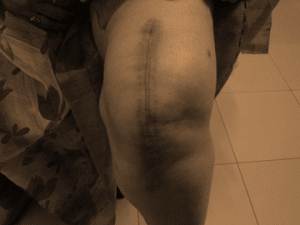Factors Associated with a Good Outcome after Knee Replacement
A study out last month on total knee replacement satisfaction and outcome looked at a number of different factors to determine which patients fared the best and were the most satisfied after this surgery. Out of 299 patients who had their knee’s replaced, 9.8% had a knee replacement complication (and by definition likely weren’t satisfied-see previous blog post). Interestingly, the factors associated with the most satisfied patients and best outcomes from total knee replacement were no complications (makes sense), being overweight, severe arthritis on x-ray, being over 70 years old, and not being depressed. If we explore the being overweight and age greater than 70 groups, my opinion would be the most satisfied patients were the ones who didn’t expect to operate at high levels of physical function after their knee replacement, which is what these two groups have in common (more obesity equals less activity, as does age over 70). When we see patients who aren’t satisfied with knee replacement, it’s usually patients who expected that they would return to being very active after their surgery. Another way to interpret this information would be that heavier patients have more pain from arthritis as they place more force on a painful joint and thus see more pain relief after total knee replacement compared to normal weight patients. In summary, those patients who were the most satisfied with their new metal knee where those who were older, heavier, not depressed, and who weren’t unlucky enough to be one of the 1 in 10 patients who had a serious complication.

If you have questions or comments about this blog post, please email us at [email protected]
NOTE: This blog post provides general information to help the reader better understand regenerative medicine, musculoskeletal health, and related subjects. All content provided in this blog, website, or any linked materials, including text, graphics, images, patient profiles, outcomes, and information, are not intended and should not be considered or used as a substitute for medical advice, diagnosis, or treatment. Please always consult with a professional and certified healthcare provider to discuss if a treatment is right for you.

